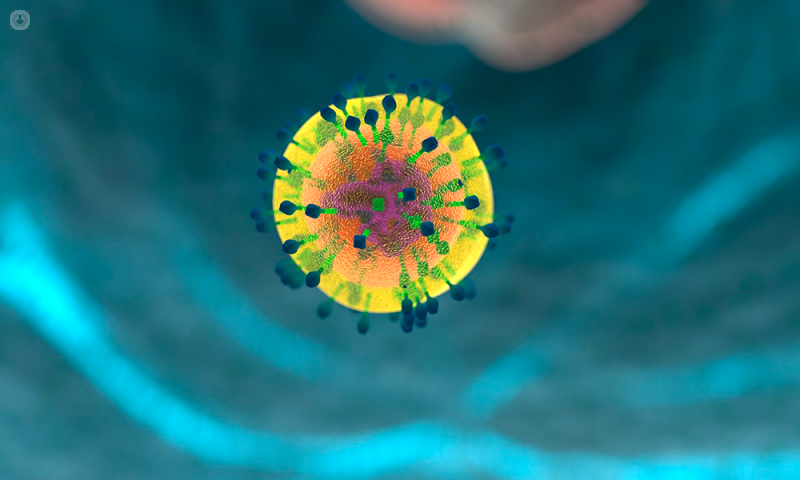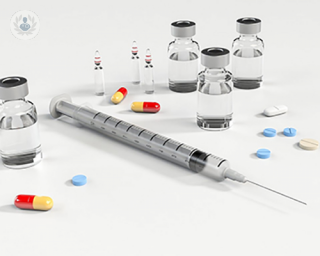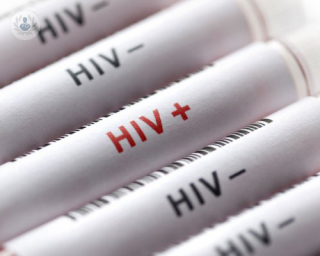HIV
Dr Pamela McHenry - Dermatology
Created on: 05-25-2017
Updated on: 10-09-2023
Edited by: Aoife Maguire
What is HIV?
HIV, or “human immunodeficiency virus”, is a sexually-transmitted infection which gradually damages your immune system over time, making you less able to fight off disease.
Left untreated, HIV can progress to AIDS (acquired immunodeficiency syndrome).
HIV currently affects about 89,000 people in the UK, or 0.16% of the adult population. Every year there are over 4,000 new HIV infections.

Prognosis
HIV cannot be cured but in today’s world it can be effectively managed with medication. Just 30 years ago, the prognosis of HIV was much more serious, as no treatment had yet been developed to effectively fight the virus.
What are the symptoms?
In the first month after being infected, you are likely to experience flu-like symptoms such as:
- headache
- tiredness
- muscles and joint pain
- swollen lymph nodes in the neck
- rash
- fever
After this initial period you may not notice any symptoms at all. This period of “latent” infection usually lasts for 10 years if you do not get treatment. During this time, the virus gradually attacks white blood cells in the body, making you more vulnerable to disease.
You won’t notice symptoms until your immune system is severely damage. At this point, symptoms can include:
- persistent fatigue
- night sweats
- recurring fever
Eventually you’ll be vulnerable to a range of infections that would not normally affect you if you had a healthy immune system. If you show signs of one of these infections, it is at this point that you will be diagnosed with AIDS.
How is HIV diagnosed?
There are several types of HIV test that can be carried out at home, at the GP’s, or in a sexual health clinic. Testing involves taking a blood sample or saliva sample, and sending it to the laboratory to check for signs of infection.
The HIV test is very accurate and can be carried out extremely quickly, with results available within days. If you test positive, you will be referred to a specialist HIV clinic.
What causes HIV?
HIV is a sexually transmitted infection (STI) and can only be passed from person to person through sexual contact or blood contamination. You can also pass it on by sharing sex toys.
You cannot catch HIV through:
- hugging
- kissing
- spitting
- being sneezed on
- sharing the same toilet or bath
- sharing towels
- being bitten
You’re most at risk of catching HIV if:
- you have unprotected sex
- you inject drugs and share needles with someone
- you have received a blood transfusion outside of North America or Western Europe
You can prevent HIV by always having protected sex with new sexual partners, and avoiding sharing needles with anybody else. If you are pregnant, you’ll be screened for HIV to ensure you get treated so that you don’t pass HIV on to your child.
How is HIV treated?
If you suspect you have just come into contact with HIV, you should seek urgent medical care. A specialist team will administer emergency drugs which can stop you from being infected.
If you have been diagnosed with HIV, you’ll be treated with antiretroviral medication. This is a combination of drugs which stops the virus from replicating itself.
You’ll need to take these drugs every day, and it’s essential that you follow the treatment plan prescribed, or the virus may become resistant to treatment. After a period of time, usually 6 months, and providing you have correctly taken your medication, your “viral load” should be reduced to undetectable levels, meaning you can’t pass the infection on.
Side effects of the medication are mild and tend to go away after a while. Unfortunately, HIV medication is not compatible with all medication, and may interfere in particular with hormonal contraceptives.
HIV can be treated by a HIV specialist.








